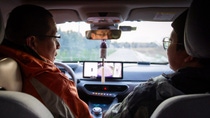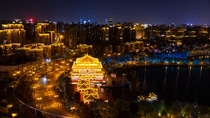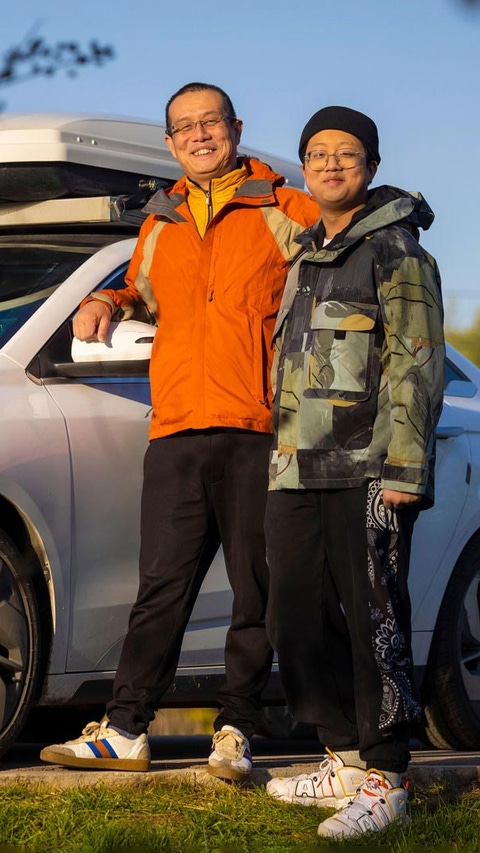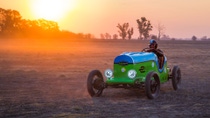Change for climate
Lao Xiao story
In our hearts, we hope to... carry the human race forward, to raise the next generation... I decided to put work to one side, whatever the consequences, and go exploring with my son... while he still listened to me! It was the most valuable experience of my life.
It might have been that one time, when Baoliang Qian’s son was still a baby, that the idea was born. Baoliang (Lao Qian, as he likes to be known), had been away on a work trip, as was so often the case at that time. He had returned home around midnight when his son, Xinze (Xiao Qian), “sat up and looked at me, as if he didn't really know me.” With emotion in his voice, Lao Qian adds “Our relationship was like that.”
Due to pressures of work, Xiao Qian spent many years of his early childhood apart from his dad. So when, several years later, Xiao Qian finally moved back to live with Lao Qian, the boy’s father spotted a chance to make up for lost time.
The idea was already there: together, Lao Qian and Xiao Qian would reconnect on a road trip to Tibet. Not only that, they would drive there... in an electric vehicle (EV).
Lao Qian lives in Xi'an. That’s nearly 2,000km away from Tibet, and much of the territory is very remote. So the idea of driving an EV there may have seemed impractical at the time – at least for Xiao Qian, who wasn’t convinced when his dad suggested it. But, an electrical engineer by training, Lao Qian relished the challenge. And when he told his son they were going to use solar panels to charge the EV out in the wilderness, Xiao Qian was intrigued.
The challenge was enormous, but Lao Qian’s sense of humour prevailed. “Tibet is a place where, even if there’s not much oxygen, there’s plenty of faith!” he jokes. He’s referring to the thinness of the atmosphere at Tibet’s high altitudes, but he’s making a serious technical point too - because, unlike vehicles with internal combustion engines, EVs don’t require much oxygen to run. And, as Lao Qian and Xiao Qian were going to sleep and eat in their vehicle along the way, Lao Qian knew it would help that EVs don’t emit any harmful gases like carbon monoxide.
.jpg)
Range anxiety? Not an issue! Lao Qian and Xiao Qian fold up one of the 30 custom-built solar panels Lao Qian brought to charge the EV.
As it turned out, Lao Qian could find no existing solar panels that were up to the job – not even close. As well as the huge power requirement, they needed to be small enough to be carried in – or on – the EV itself. In the end, with a friend’s help, Lao Qian built 30 ultra-thin solar panels, each capable of delivering 200W of power. He then custom-built a roof-rack to carry the panels when not in use. Lao Qian’s panels were the basis of an entire alternative power grid that would make his and Xiao Qian’s trip possible.
Despite Lao Qian’s meticulous planning – which included bringing a charger, a fridge, a cooker and an oxygen generator (essential for Tibet’s high altitudes) – it didn’t all go entirely smoothly. “Lots of my friends tried to talk me out of the trip”, he recalls, even conceding “I was a little impulsive.”
This must have been most apparent when Lao Qian and Xiao Qian found themselves 3km from the top of Dongda Mountain with only 23% charge left in their EV’s battery. If they could make it to the top, the car would recharge itself on the way back down. But if they couldn’t...?
.jpg)
Lao Qian and Xiao Qian’s EV round-trip was nearly 4,000km long. “As our forefathers used to say, ‘He that travels far knows more.’”
In the end, Lao Qian took the sensible option of stopping and recharging the EV’s battery. But while it was charging, he and Xiao Qian started to feel the effects of oxygen deprivation. Again, though, Lao Qian’s immaculate preparations came to the rescue and the oxygen generator did its job. They were soon up and running, and made it over the mountain, making their nightly camp on the other side.
Lao Qian recalls the rest of the trip with immense pleasure.
In our hearts, we hope to... carry the human race forward, to raise the next generation... I decided to put work to one side, whatever the consequences, and go exploring with my son... while he still listened to me! It was the most valuable experience of my life.
.jpg)
What makes a man try to drive an electric vehicle through the wilderness of Tibet? A desire to reconnect with his son... and 30 solar panels!
But it’s when Lao Qian reflects on the deeper significance of their epic journey that emotion comes into his voice again. Of EVs, he says “I think our entire future, not just the future of this country, but of all mankind, should be going in this direction.” As his epic journey shows, when you combine EVs with innovative energy resourcing technology, EVs can take us as far as we dream to go. And of the trip itself:
Since Xiao Qian was born, it was the first time I spent time with him alone. It’s been the most valuable experience of my life. From the bottom of my heart, it meant a lot. And since coming back, there is a feeling of having met a challenge... a sense of accomplishment. Isn’t that what we live for?
.jpg)
A long way from the mountains and plains of Tibet: Lao Qian and Xiao Qian’s home town of Xi’an.


